SanDisk Ultra Plus SSD Review (256GB)
by Anand Lal Shimpi on January 7, 2013 9:00 AM ESTAnandTech Storage Bench 2011
Two years ago we introduced our AnandTech Storage Bench, a suite of benchmarks that took traces of real OS/application usage and played them back in a repeatable manner. I assembled the traces myself out of frustration with the majority of what we have today in terms of SSD benchmarks.
Although the AnandTech Storage Bench tests did a good job of characterizing SSD performance, they weren't stressful enough. All of the tests performed less than 10GB of reads/writes and typically involved only 4GB of writes specifically. That's not even enough exceed the spare area on most SSDs. Most canned SSD benchmarks don't even come close to writing a single gigabyte of data, but that doesn't mean that simply writing 4GB is acceptable.
Originally I kept the benchmarks short enough that they wouldn't be a burden to run (~30 minutes) but long enough that they were representative of what a power user might do with their system.
Not too long ago I tweeted that I had created what I referred to as the Mother of All SSD Benchmarks (MOASB). Rather than only writing 4GB of data to the drive, this benchmark writes 106.32GB. It's the load you'd put on a drive after nearly two weeks of constant usage. And it takes a *long* time to run.
1) The MOASB, officially called AnandTech Storage Bench 2011 - Heavy Workload, mainly focuses on the times when your I/O activity is the highest. There is a lot of downloading and application installing that happens during the course of this test. My thinking was that it's during application installs, file copies, downloading and multitasking with all of this that you can really notice performance differences between drives.
2) I tried to cover as many bases as possible with the software I incorporated into this test. There's a lot of photo editing in Photoshop, HTML editing in Dreamweaver, web browsing, game playing/level loading (Starcraft II & WoW are both a part of the test) as well as general use stuff (application installing, virus scanning). I included a large amount of email downloading, document creation and editing as well. To top it all off I even use Visual Studio 2008 to build Chromium during the test.
The test has 2,168,893 read operations and 1,783,447 write operations. The IO breakdown is as follows:
| AnandTech Storage Bench 2011 - Heavy Workload IO Breakdown | ||||
| IO Size | % of Total | |||
| 4KB | 28% | |||
| 16KB | 10% | |||
| 32KB | 10% | |||
| 64KB | 4% | |||
Only 42% of all operations are sequential, the rest range from pseudo to fully random (with most falling in the pseudo-random category). Average queue depth is 4.625 IOs, with 59% of operations taking place in an IO queue of 1.
Many of you have asked for a better way to really characterize performance. Simply looking at IOPS doesn't really say much. As a result I'm going to be presenting Storage Bench 2011 data in a slightly different way. We'll have performance represented as Average MB/s, with higher numbers being better. At the same time I'll be reporting how long the SSD was busy while running this test. These disk busy graphs will show you exactly how much time was shaved off by using a faster drive vs. a slower one during the course of this test. Finally, I will also break out performance into reads, writes and combined. The reason I do this is to help balance out the fact that this test is unusually write intensive, which can often hide the benefits of a drive with good read performance.
There's also a new light workload for 2011. This is a far more reasonable, typical every day use case benchmark. Lots of web browsing, photo editing (but with a greater focus on photo consumption), video playback as well as some application installs and gaming. This test isn't nearly as write intensive as the MOASB but it's still multiple times more write intensive than what we were running in 2010.
As always I don't believe that these two benchmarks alone are enough to characterize the performance of a drive, but hopefully along with the rest of our tests they will help provide a better idea.
The testbed for Storage Bench 2011 has changed as well. We're now using a Sandy Bridge platform with full 6Gbps support for these tests.
AnandTech Storage Bench 2011 - Heavy Workload
We'll start out by looking at average data rate throughout our new heavy workload test:
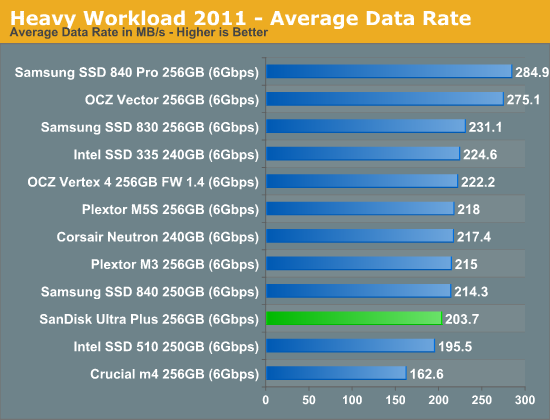
The Ultra Plus does ok in our heavy workload, hot on the heels of Samsung's SSD 840. By no means is this the fastest drive we've tested, but it's not abysmal either. We're fans of the vanilla 840, and the Ultra Plus performed similarly. Architecturally it's a bit of a concern if Samsung's TLC drive is able to outperform your 2bpc MLC drive though.
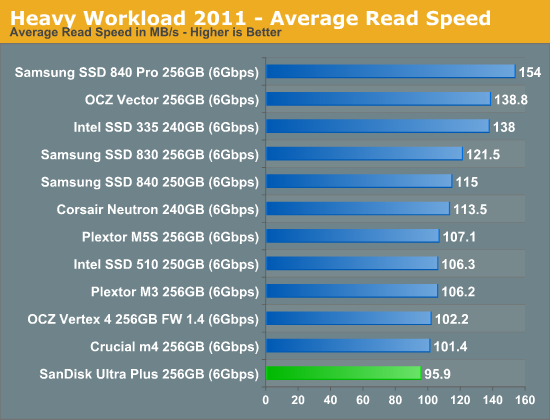
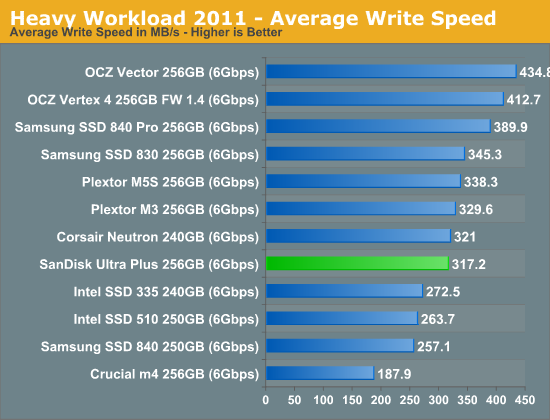
The next three charts just represent the same data, but in a different manner. Instead of looking at average data rate, we're looking at how long the disk was busy for during this entire test. Note that disk busy time excludes any and all idles, this is just how long the SSD was busy doing something:
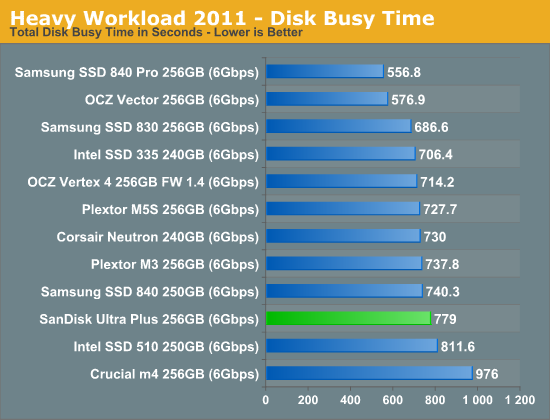
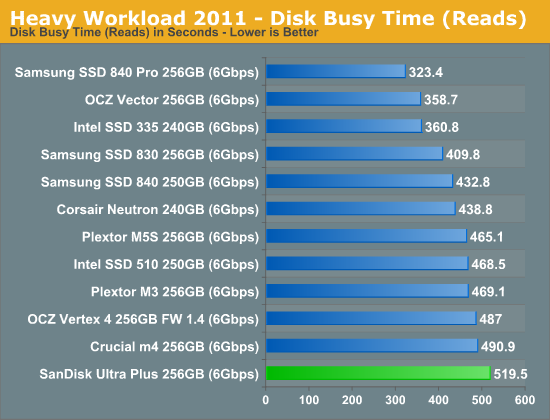
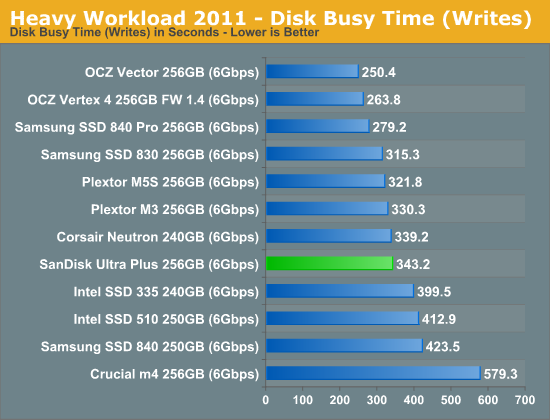










38 Comments
View All Comments
name99 - Monday, January 7, 2013 - link
If you want to buy flash, buy flash.If you want to buy an iPod, buy an iPod.
But DON'T whine that an iPod (or iPhone, or iPad) costs "too much" because the flash in it is cheap.
It's not 2003. We all know Apple costs more (sometimes a little more, sometimes a lot more) than the competition. We also all know that Apple provides more (sometimes a little bit more, sometimes a lot more) than the competition. What we DON'T need is MORE fscking half-assed bitching about whether Apple does or does not "cost too much".
You want to do that, go read the comments on any damn tech site for any year from about 1976 onwards. Just don't waste our time bringing up the issue on modern threads, especially threads that have NOTHING to do with the cost of Apple's products.
Death666Angel - Monday, January 7, 2013 - link
It's not Apples products only, this applies to all tablets/smartphones. Google charges 50$/€ for an 8/16GB upgrade. Also, if you want to whine about people whining about Apple, please don't.mayankleoboy1 - Monday, January 7, 2013 - link
And if you want to whine about people whining about people whining about Apple, please dont.runeks - Monday, August 5, 2013 - link
I really have to say I agree with this.This is not a choice between an Apple (or any other company's) device costing either "$n for a 16GB version and $n+200 for the 64GB" version or "$n for a 16GB version and $n+50 for the 64GB version". It's the choice between the former or a "$n+150 16GB version and a $n+200 64GB version". See? You're happy now, because the difference in price reflects the cost of the more expensive part. Except no one will every buy a 16GB version. Why would they? Only $50 more for 64GB. At the same time they would shut out a part of the market that just wants an iPhone, which they can get for $n, if you don't have the requirement of them only selling devices with largers capacity at the added cost for the part in question.
Pricing is so much more than just the cost of a chip. It's the way the company makes its money back on an investment. They wouldn't be able to sell the larger capacity phone at +$50 because that would raise the price of the low capacity phone and shut out a part of the market that wants that $n phone. And these people would say "Oh, see, Samsung phones only cost $n for a 16GB version, why does an iPhone have to cost $n+150?" It's an eternal neverending loop of some segment of your customer base that are not quite satisfied. The people who really like the 64GB version are dissatisfied with paying $200 more than the 16GB version, but the people who only need 16GB are glad to be able to get it for $200 less than the 64GB version. You change the rules and you just make a different customer segment unhappy, or just unwilling to buy your product.
SanX - Wednesday, January 9, 2013 - link
4k read/write random/seq - 600MB/s8k read/write random/seq - 600MB/s
128k read/write random/seq - 600MB/s
8GB SDRAM power off safe cache
zyk - Wednesday, January 9, 2013 - link
It's nice to see Anand finally get some different brands to test, but unfortunately he probably missed the party on some key drives. There had been excellent prices on SanDisk's Extreme line of drives and it would have been nice to see how SanDisk's combination of high density / low die count toggle mode NAND stacked up against the likes of the Patriot Wildfire or OCZ Vertex 3 Max IOPS - Which was less extreme of a channel limitation as this marvell based drive. Also missing from his tests were drives from those such as Mushkin Enhanced who's Chronos Deluxe was frequently the cheapest togglemode+sandforce 2nd gen drive on newegg. Since all these other brands are missing from Anand's testing, it would be nice to get these charts to show a little bit more details in them about controller and NAND type rather than just linkspeed and occationally firmware version, so they don't have to be constantly looked up when making decisions.Kristian Vättö - Wednesday, January 9, 2013 - link
I finally got a Chronos Deluxe from Mushkin. I originally asked for it over 6 months ago (due to reders' request) but there were some issues with getting in contact with Mushkin.I think Anand also has a SanDisk Extreme.
To be honest, there aren't big differences between SandForce based SSDs. Corsair Force GS is an example of a SF-2281 drive with Toggle Mode NAND and FW 5.x.x, all similar SSDs I've tested (coming soon!) perform very similarly.
fritz33 - Friday, July 12, 2013 - link
I just bought a Lenovo X201 Tablet. Can i use this drive with activated Windows 7 Bitlocker? Will Bitlocker slow down this drive and wear it down noticeable? Or does this drive have a hardware encrypten like the Crucial M500 from your review? If so how would i use it instaed of Bitlocker? I am sorry but I don't have any experience in encrypted drive.